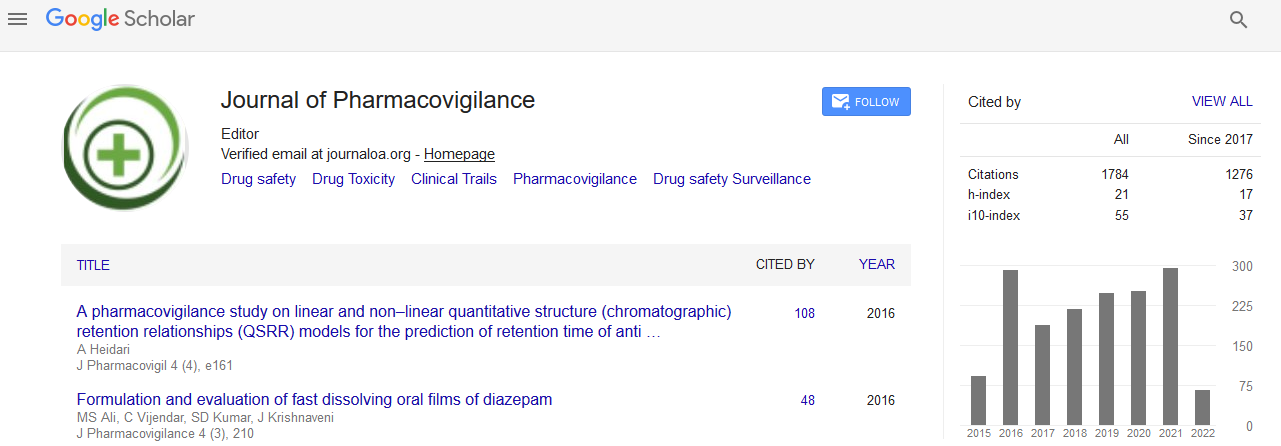Indexed In
- Open J Gate
- JournalTOCs
- The Global Impact Factor (GIF)
- RefSeek
- Hamdard University
- EBSCO A-Z
- OCLC- WorldCat
- Publons
- Euro Pub
- Google Scholar
Useful Links
Share This Page
Journal Flyer

Open Access Journals
- Agri and Aquaculture
- Biochemistry
- Bioinformatics & Systems Biology
- Business & Management
- Chemistry
- Clinical Sciences
- Engineering
- Food & Nutrition
- General Science
- Genetics & Molecular Biology
- Immunology & Microbiology
- Medical Sciences
- Neuroscience & Psychology
- Nursing & Health Care
- Pharmaceutical Sciences
Assessment of knowledge, attitude and practice of health care professionals and factors associated with adverse drug reaction reporting in public and private hospitals of Islamabad
9th International Conference and Exhibition on Pharmacovigilance & Drug Safety
July 17-18, 2017 Munich, Germany
Zaka Un-Nisa
Quaid-i-Azam University, Pakistan
Posters & Accepted Abstracts: J Pharmacovigil
Abstract:
Aim: Adverse Drug Reactions (ADRs) under-reporting is a great challenge to pharmacovigilance. Health care professionals should consider ADR reporting as their professional obligation as effective system of ADR reporting is important to improve patient care and safety. This study was designed to assess the knowledge, attitude, practice and factors associated with ADR reporting by health care professionals (physicians and pharmacists) in public and private hospitals of Pakistan. Methods: A pretested questionnaire comprising of 27 questions (knowledge 12, attitude 4, practice 9 and factors influencing ADR reporting 2) was administered to 384 physicians and pharmacists in public and private hospitals. Respondents were evaluated for their knowledge, attitude and practice related to ADR reporting. Additionally the factors which encourage and discourage respondents to report ADRs were also determined. Results: The data was analyzed by using the SPSS statistical software. The response rate was 95.32%. Of the 367 questionnaire which were analyzed, 333 (86.5%) were physicians and 34 (8.8%) were pharmacists. The mean age was 28.34 (SD=6.69). Most of the respondents showed poor ADR reporting knowledge (83.1%). Majority of respondents (78.2%) showed positive attitude towards ADR reporting and only (12.3%) hospitals have good ADR reporting practice. Knowledge of respondents in public hospitals (8.6%) was less as compared to those in private hospitals (29.7%) p<0.001. Attitude of respondents in private hospitals was more positive (92.4%) than those in public hospitals (68.8%) p<0.001. No significant difference was seen in practicing of ADR reporting in public (11.8%) and private hospitals (13.1%) (P value 0.89). Seriousness of ADR, unusualness of reaction, new drug involvement and confidence in diagnosis of ADR are the factors which encourage respondents to report ADR whereas lack of knowledge regarding where and how to report ADR, lack of access to ADR reporting form, managing patient is more important than reporting ADR, legal liability issues are the factors which discourage respondents to report ADR. Conclusion: This study reveals poor knowledge and practice regarding ADR reporting. However, most of respondents have shown positive attitude towards ADR reporting. There is a need of educational training as well as sincere and sustained efforts should be made by government and hospital authorities to ensure proper implementation of ADR reporting system in all hospitals.
Biography :
Email: zakamaqsood112@gmail.com


